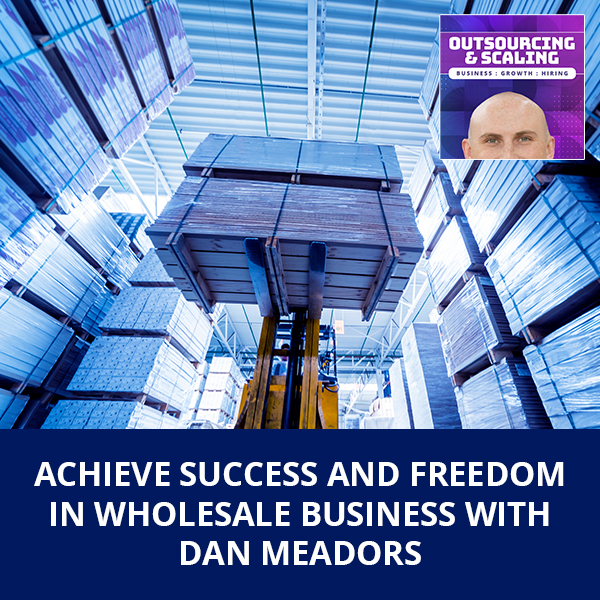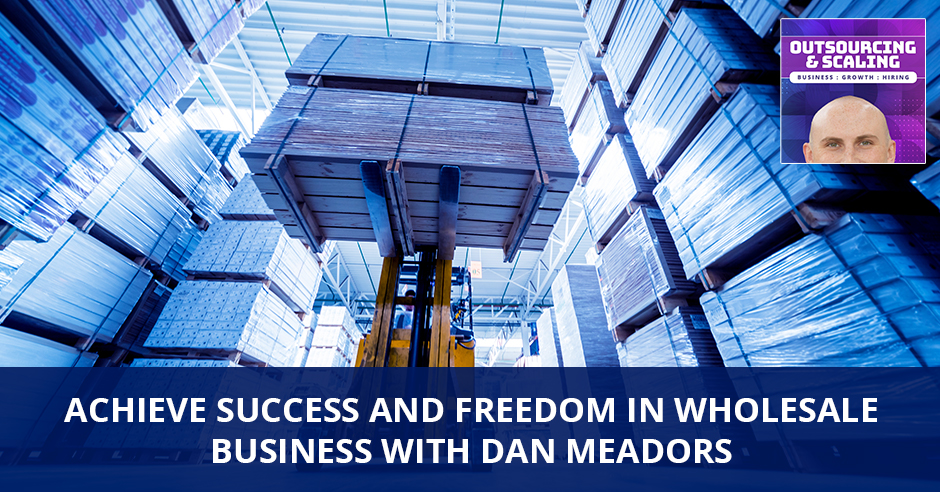


Dan Meadors had no background in entrepreneurship prior to doing wholesale on Amazon. He and his partner, Eric Lambert, spent years developing a system to take advantage of wholesale opportunities that allow their business to flourish. Thus, The Wholesale Formula was born. In this episode, Dan opens up on how he dedicates his life in teaching others how to grow and scale their own business on Amazon. He also talks about using virtual assistants in their business. He insists that the performance of VAs reflect not on their personal skills, but more on your onboarding and training process.
—
Listen to the podcast here:
[smart_track_player url=”https://www.podetize.com/statsapi/www.podetize.com/wp-content/uploads/fileuploads/11-5b145ef137b51b3d1af0633e9305c43d/11/2019/1af403a46f280eb1ae51ab54aba537fa.mp3″ title=”Achieve Success And Freedom In Wholesale Business With Dan Meadors” artist=”Nathan Hirsch” image=”https://freeup.net/wp-content/uploads/2019/04/OAS.png” ]
Download the audio file here.
Achieve Success And Freedom In Wholesale Business With Dan Meadors
My guest is Dan Meadors. Dan, how are you doing?
Pretty good. How are you?
I’m doing great. I’m excited to talk to you. We haven’t had someone talk about wholesale yet. For those of you that don’t know Dan, he entered the Amazon Marketplace in 2011. After a few months, he saw the real potential of selling on Amazon. He left his day job to become a full-time Amazon wholesaler and is now the Co-Founder of The Wholesale Formula, now a multimillion-dollar Amazon seller and an Amazon Marketplace master. Dan is passionate about sharing his knowledge with others who are as driven to succeed. Together with his team of experts of The Wholesale Formula, Dan dedicates his time teaching others to grow and scale their wholesale Amazon businesses, empowering students with a wide range of experience from those with no Amazon experience to a lot. The Wholesale Formula has helped people sell over a billion dollars’ worth of products on Amazon. First, I want to take a gigantic step back. Talk to me about what you were like growing up. Were you a rebel? Where you a straight-A student? Did you know you wanted to be an entrepreneur?
No, I had no idea, to be honest with you. I grew up pretty poor. Both of my parents were employed. They had that employee mentality. There were definitely no thoughts of entrepreneurship when I was growing up. Whenever as a little kid, the one thing I wanted to be was a lawyer. I had a baseball coach who would buy me things like snacks and stuff like that. Being able to see somebody that was able to help other people was incredible. I didn’t even know what a lawyer did, but I wanted to be one when I grew up. After I graduated college, I picked that pre-law route. I stumbled up there.
My wife was about a semester behind me. I went and got a job locally at an online retailer that sold toys and games. That’s where I fell in love with online business in general, the connectivity and the ability to find clients and not be a locally-based business was completely mind-blowing and something I truly loved. That’s where that entrepreneurial spark hit. I saw many opportunities and things you can do online.
What is it about wholesale? I started off with dropshipping. If dropshipping is not dead now, it’s pretty close. It’s very tough to do. There are a lot of people doing FBA. You see all the courses, all the gurus. There are not that many people preaching and teaching wholesale. What is it about wholesale that attracted you and that has kept you doing it going forward?
For us, it’s been one of the easiest models. We’ve tried and failed at a lot of things. We were retail arbitrage-based when we first started. For anybody who doesn’t know what that is, it’s going into physical stores buying products to resell at a profit online. It was a nightmare. We made great money, but the problem was we were never able to stop working. Every time we did stop working, our sales started dropping. What we had done is we’ve created ourselves high-paying intense jobs. Knowing that, we tried to come up with other ways to generate income. Our first one was a brick-and-mortar toy store. What we didn’t factor was how small our town is. We live in a town that has 7,000 people. A brick-and-mortar toy store, while it was an awesome store, it didn’t have the foot traffic to succeed. We ended up having to sell it.
The problem with retail arbitrage-based businesses is you never stop working. Every time you stop, sales start dropping.
We tried another business. My kids and Eric’s kids at the time were into My Little Pony collectibles. We watched a documentary one time and it was like about bronies. I was like, “There are people that collect this stuff.” We researched it a bunch then we made a website about My Little Pony collectibles. That one didn’t go so well either, we ended up selling it. We started dabbling with private label and we weren’t very good at driving traffic, creating listings and all the things that go into that. I think that’s a great model, but the problem is you have to be good at those certain skills. If you’re not, then you will struggle.
We found wholesale, which was the same as private label in that once you establish yourself with SKU, you’re able to replenish that SKU over and over. That was attractive to us. First, it was the sheer scalability and the simplicity of it was why we dove into wholesale and ultimately why I stuck. It gave us the ability to create a real business that if I stop working then my business still operates because it’s built around systems, through automation and outsourcing.
I know you guys use a lot of Vas. Can you talk to the audience about how you do it? One of the things I see here and there on the FreeUp Marketplace, you get people who say, “I want to hire a $5 an hour VA. I want them to source products,” but the only directions that they give them is go find me profitable products. There’s no system. There’s no process behind it. How important is it to have that process? How are you utilizing Vas in your business?
We utilize VAs for all those tasks. We utilize VAs for account management, customer service. If we need to file cases, we need to file for reimbursements, our virtual assistants handle all that. They also handle all of our scouting and finding products, all of our initial contact with vendors. Virtual assistants, I think that’s maybe the disconnect is that the people don’t realize the value of a true virtual contractor. Those contractors can only be as good as the direction you give them. You can put the smartest person in the world into a role where they don’t know what they’re doing and they fail.
The same is true with virtual assistants. Originally, we had those same problems. When we hired virtual assistants, the work quality would come back and it would be scattered. You would see some great work. You would see some terrible work. Ultimately, what we figured out was that it wasn’t a reflection of the contractor. It was a reflection of our training processes. That was where we dialed in and tried to focus on trying to decide the optimal way to do things. Creating a process is simple. It’s understanding the objective and creating a process that gets you to that objective every time. It’s the optimal way to do things.
Once we started doing that, we started focusing our training around this is the one way I want you to do it. I want you to do it like this every single time. We had that process literally spelled out step-by-step. We included a video of us doing that process. What we saw is the quality of work got consistent, it got consistently better too. That’s the thing once you are able to get that consistency, then you’re able to tweak individual things to get the work level to exactly where you want it. You’re changing a small part of a process. It’s not an easy thing to do, but I think it’s absolutely necessary particularly if you’re going to use any contractors, let alone virtual assistants. In regard to people who might use temporary virtual assistants. I know that’s probably a thing in your platform.
We have people who might have the same VA for three years full-time. Other people will hire someone to build a website and never talk to them again and everything in between. It’s a pretty wide range.

Particularly for any of those jobs where I feel like you’re going to be going back and bringing somebody on, but you’re not going to have them in a contract for three years. Maybe it’s a two-month task or a month-long task. It’s something you’re going to do a couple of times a year, three times a year. It’s very important to get processes in place for those types of things. Otherwise, you’re spending a large amount of time training. That was another problem we had originally is we spent so much time training. You’re trying to make them remember something that it’s a job to them. It’s not necessarily something they’re incredibly passionate about so it’s a job. It’s hard to develop any level of consistency, any level of high-quality work if you don’t have those processes and training methods in place.
That’s one of the things that we focused on internally with our VAs is how do we take the month-long training process and move it down to two weeks? I’m talking about my internal team, not the VAs on the platform. That’s a huge part of it that people don’t realize. Anything you can do to make the process simpler, easier, faster is only going to help you. When someone does quit, if someone gets sick or whatever it is, it’s a lot easier to replace someone in two weeks than if it takes you two months to onboard the next person. What do you look for when you’re trying to hire someone?
We look for intelligent people who are excited about working. If you have the right processes and training methods in place like you can train them, but for the most part we try to start with a more blank canvas unless it’s a specific one-off job or something like that. If it’s somebody that we’re going to be utilizing for a long period of time, I want them to go through my entire training process. I want them to be utilizing the exact strategies that we use for that consistency. Whenever we hire somebody, I like to realize that they’re intelligent and very motivated. I feel like if you give me an intelligent person who’s motivated, we can accomplish almost anything.
Talk to me about communication. You guys are pretty big now. You’ve got a lot of VAs. I know you have a business partner too. What does that communication look like? Is it daily? Is it weekly?
I think you have to communicate with your contractors daily. Even if you’re in that virtual setting, it’s important to give feedback and it’s important to let them know that their job’s important and that somebody cares about it and monitors it. If you’re giving intermittent feedback, it’s hard for them to stay motivated. It’s hard for them to realize that they’re doing a great job. Even if it’s checking in on like for our sourcing VAs, we have a shared document that we can review. We review it daily and leave comments like, “Great job.” Any level of feedback that we need to but I feel like that constant feedback keeps them much more motivated and gets a higher quality of work.
I want to pick your brain here because people hiring VAs for sourcing a lot of times don’t give them enough information. They don’t give the right steps. What does a good sourcing process look like? How do you know that the process is good enough to hand over to a VA?
It’s got to be incredibly binary. That’s the thing for us is we’ve tried to make as many of those sourcing decisions as possible binary. What I mean by that is a simple yes, no. We give them incredibly detailed criteria. For example, one of our initial criteria is that Amazon doesn’t sell the product. If Amazon sells that product, we’re not interested in carrying it. That’s an automatic no. The product sells more than 60 times per month. That’s an incredibly binary thing, either it does or it doesn’t. If it does, as long as it passes the next criteria, it’s going to make a list. Another example of criteria that we utilize is that it’s sold by more than three sellers and that’s the key to a lot of private label products. I’m not going to teach necessarily a virtual assistant. For what it’s worth, I don’t feel like I can teach my mom to identify private label products. The expectation that they would is not reasonable either. Instead, it’s rather than try to give advice that could be taken multiple ways, I think it’s important to give binary guidelines for them to operate with.
People don’t realize the value of a true virtual freelancer. They can only be as good as the direction you give them.
Making everything yes, nowhere it’s black and white, one way or the other instead of, “Is this product good or bad or anything in between?” That’s a much better way to go. Take us behind the scenes of a large wholesale business. What is it that the average or maybe a six-figure wholesale seller is not doing that a seven or eight-figure seller is?
It’s outsourcing and automation. That was originally our makeup too is the same thing as we weren’t outsourcing, we were trying to do all these things ourselves. When you do that, your ability to grow is limited to what you’re capable of. Whenever you start utilizing those services, there’s a byproduct of you have to work less of your business, which is a good thing, but you’re able to get more ground. To go back to that example where I was talking about the criteria for virtual assistants, are they going to miss fringe things along the way? Of course. Could I source better than them? Yeah, but I can’t source better than five of them.
When you start talking about that, even if they’re 80% as proficient as I am, the ability to hire multiple people and perform that task, the level of productivity goes up so much that it forces your business to grow. For people who are wanting to grow their wholesale business specifically actively, focus on removing yourself from tasks. If you have a task that you do every day, if you want to grow and scale, you can’t be doing that. You have to find ways to make yourself irrelevant within your own business. It can be uncomfortable, but the ability to grow is there if you can do it. You can’t grow beyond what you’re capable of if you’re not outsourcing and you’re not automating and doing things. For people that are looking to do that, the real trick is working less and working on your business rather than in your business is a big key.
Let’s talk about the wholesale formula. I think you’re doing some awesome stuff there. I have clients who rave about you, say that taking your course was the best thing they’ve ever done. That’s helped them scale their business. Even if they’re also doing private label and other stuff, they have now implemented wholesale as a big part of their business. What made you start that? Why not keep all that knowledge internal? Where are you at now? You’re a few years into doing this.
Whenever we first started also internally, we had no intention of ever making a course or anything like that. One day, one of our buddies who he does some stuff in the digital marketing space. He was in our office. It was funny because we were just there playing board games one night and he’s like, “What is it that you guys do?” I explained the process and I walked him through the warehouse and told him what our business was. He was like, “You guys should do a course about this. I’m telling you, people would definitely be interested and wanting to know more.” We didn’t believe it at the time, to be honest, it’s like any other thing like people could just figure it out.
Whenever you’re in that mode, you don’t realize. It took us six years to figure out where we were, not even where we’re at now. That’s how we got started with a course is he challenged us to make one. We did make one and it went well, but the course has grown and evolved along with that community. At this point, we’ve had more than 3,500 students who went through our course. Our students have done more than a billion dollars in sales. It’s not just that, it’s the lives that I’ve seen changed. We’ve got to be in it. We’ve got to experience that, be a part of it. It’s a great part of our community. It’s like hearing people’s success stories and seeing the encouragement that they’re able to offer to the newer folks going through. It’s been a great ride.
What changes do you see with Amazon, anything that would affect wholesale good or bad?

I think it depends on how you look at change. For the most part, we typically see change as good. Even if it negatively affects us and the reason for that is it negatively affects everybody and I trust our ability to adapt. I understand that we have the ability to adapt and we’re pretty nimble with that stuff. It’s mostly the same kind of stuff. Category brand restrictions are still a thing, but we love that. We love hurdles that make it harder for people to do stuff. We realize that most people are willing to take those actions. We’ve seen a lot of growth with sponsored ads as well and I think that’s a big important part of Amazon. It’s something there they’re pushing a lot is sponsored ads. There are so many changes. Amazon is literally always changing. You have to be malleable and have processes that can adapt and adjust.
Are you guys running sponsored ads for wholesale products? When I think of sponsored ads, I definitely don’t think wholesale.
100%, originally, whenever we were running sponsored ads, we were doing it as a value to the vendors that we’re working with. When we talked to them, it’s like, “Sponsored ads are a strategy to help you acquire new customers and we can dedicate this much of a budget to it.” At the time, we were losing money running ads, but the more work we’ve done with ads, the more learning of that process. Now, ads are profitable for us. Whenever you’re running profitable ads, how much money should you spend on it? As much as you can, as long as I’m making money, I should continue to pour it in. Ads have been an absolute monster for us.
Dan, this has been great. Where can people find out more about you? What are you most excited for?
Find out more about us at our website, TheWholesaleFormula.com. For us, it’s doing the same thing. We’re super excited to continue working with people, seeing people develop new awesome businesses and the growth within the community. We’ve updated our course at this point seven times to reflect all the new strategies and things that were we’re doing. A lot of that comes from within that community. I feel like our communities like that little hive mind. It’s increased our ability to make a change so much and it’s an awesome shared experience.
Thanks so much for coming on.
Absolutely, thanks for having me.
Important Links:
About Dan Meadors
 Dan Meadors entered the Amazon marketplace in 2011. After just a few months, he saw the real potential of selling on Amazon, left his day job to become a full- time Amazon wholesaler, and is now the co-founder of The Wholesale Formula. Now a multi-million-dollar Amazon seller and an Amazon marketplace master, Dan is passionate about sharing his knowledge with others who are just as driven to succeed. Together with his team of experts at The Wholesale Formula, Dan dedicates his time to teaching others how to grow and scale their own wholesale-based Amazon businesses.
Dan Meadors entered the Amazon marketplace in 2011. After just a few months, he saw the real potential of selling on Amazon, left his day job to become a full- time Amazon wholesaler, and is now the co-founder of The Wholesale Formula. Now a multi-million-dollar Amazon seller and an Amazon marketplace master, Dan is passionate about sharing his knowledge with others who are just as driven to succeed. Together with his team of experts at The Wholesale Formula, Dan dedicates his time to teaching others how to grow and scale their own wholesale-based Amazon businesses.
Dan has empowered students with a wide range of experience — from those with little or no Amazon experience to Amazon veterans who were inspired to take their business to the next level. Students of The Wholesale Formula have collectively sold over half a billion dollars’ worth of products on Amazon.
